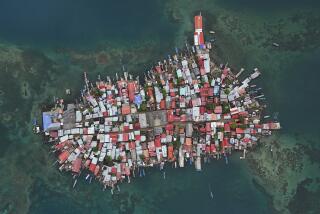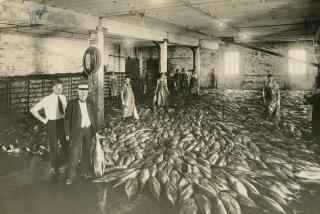Simpler Way of Life Thrives in Isolated Community on Chesapeake Bay : Island: The ‘90s coexist with elements that are timeless. Also surviving is a taste for work on the water--and a distaste for the conventional.
- Share via
TANGIER ISLAND, Va. — Tourists come here by boat--the only way to get here except by air--to take a look at one of the New World’s earliest places of settlement, sheltered by isolation from both the American mainland and mainstream.
It is a dot of land in the Chesapeake Bay where the pace of life is as unhurried as the crabs scuttling in a marsh creek.
But across wetlands undisturbed since before the British settled in the 1600s, a black satellite dish brings the mainland’s news and entertainment to an island home.
On Tangier Island, the 1990s live in an easy coexistence with elements of bay life that are timeless.
The fishermen here, where they are called watermen, ply a trade little changed from those of their ancestors and still bear the names of the earliest settlers--Crockett, Pruitt, Parks. Like their forebears, they haul their catch to market by boat, about 10 miles to the nearest point of the mainland. There are no bridges.
The marsh water where the crabs spawn has always been the economic lifeblood of the community, which now numbers 658 people. Mayor Dewey Crockett says 95% of them work in the seafood trade.
It is no easy life. Twenty-hour workdays are not unusual in the summer, said Jeff Crockett, president of the watermen’s association.
Work might start around 2 a.m. near a waterman’s dock at shallow troughs in which crabs are held until they shed their shells--actually their skeletons. Newly molted crabs, softshells, command a higher price.
Later, the waterman will take his small boat onto the bay for several hours to bring in more crabs, hardshells. After lunch and perhaps a nap there’ll be more work at the dock.
“You don’t mind doing this kind of work if you’re making a good living out of it,” the waterman said. “But if you’re not making so much money, you ain’t long before you change jobs.”
This year, there isn’t so much money. The bay has produced a bountiful harvest, but the bounty itself has become a curse, glutting the market, driving down prices.
“It’s been quite a struggle for the watermen to pay their bills,” Mayor Crockett said. “The men never know what they’re going to receive.”
Changing jobs almost always means leaving the island, giving up a way of life familiar since birth. But many graduates of Tangier Combined School are forced to do just that.
“We couldn’t really hold them all every year, because I don’t know what we’d do for places to live,” said Principal Dennis Crockett.
He said about 60% of his students go on to college and usually do well, having received a great deal of individual attention from kindergarten to 12th grade in Tangier’s small classes.
“We’ve found out here if you can give them a good basic core, when they go to college they blossom,” he said.
The school is more than just a ticket off the island. Tangier residents say the school and the two churches are the focus of social life.
Although the school is in no interscholastic league, basketball games are popular events, said Nina Pruitt, the school librarian.
“We play maybe six to 10 games a year, just with anybody who’s willing to play with us,” she said.
Isolated from the mainland’s secular diversions, religion flourishes.
“I have laymen who can probably preach and teach as well as anyone,” said the Rev. George Close, pastor of Tangier’s Swain Memorial United Methodist Church. “They study the word daily.”
The close-knit island community also retains a distinctive pattern of speech that some say might retain accents reminiscent of the original British residents. For example, the word crab sounds like “crayb” to a mainlander.
Pruitt said she lived in nearby Norfolk for a time and learned to alter her speech for the benefit of mainlanders.
“After living in Norfolk for two weeks and having to repeat everything that came out of my mouth, I quickly changed,” she said.
Those who can find a way to stay seem quite content in their comfortable frame houses, tidy yards and satisfying way of life.
The sounds of Tangier’s traffic are the muted sounds of golf carts and mopeds, no rumble, no exhaust, all they need to get around on an island without a highway.
“So many people think we are so backward and behind the times,” Pruitt said. “A lot of people come here to try to save us--from what I don’t know. We think we’re doing right well without being saved by strangers.”
Jeff Crockett feels likewise. “They think we’re living out here with palm trees and skirts on or something,” he said. “You just wonder where some people have been all their lives.”
He also said old-timers on the island feared change, but the watermen’s way of life survives because Tangier isn’t big enough for tourism to eclipse the seafood-based economy. “As long as people eat crabs, we’re going to be catching them.”
The younger adults on the island are less afraid of change, he said.
“I can’t wait to get up the next day and see what’s coming new,” said the 35-year-old Crockett.
Tourists, who visit Tangier by boat, often remark that they’d hate to have to live in a place with no full-time doctor, no bank and no drugstores, Crockett added.
More to Read
Sign up for The Wild
We’ll help you find the best places to hike, bike and run, as well as the perfect silent spots for meditation and yoga.
You may occasionally receive promotional content from the Los Angeles Times.






